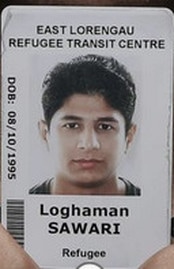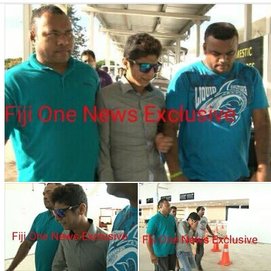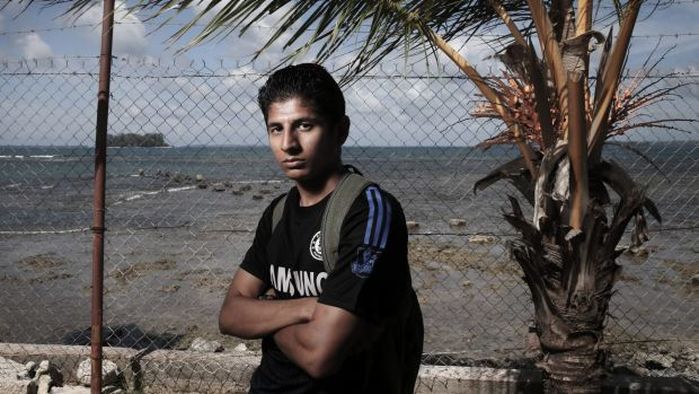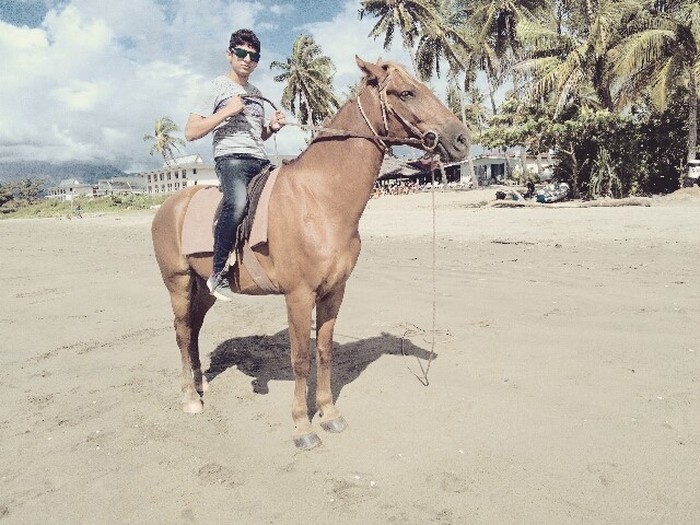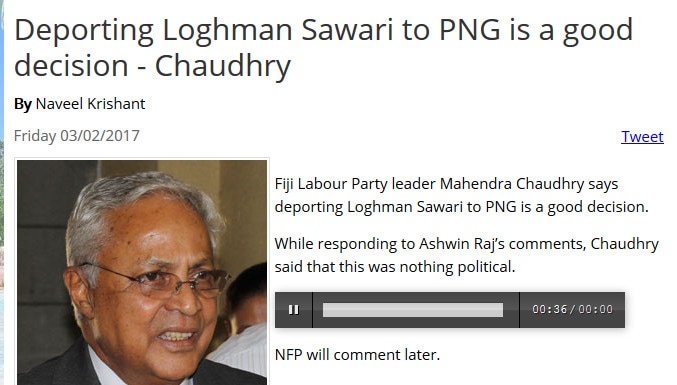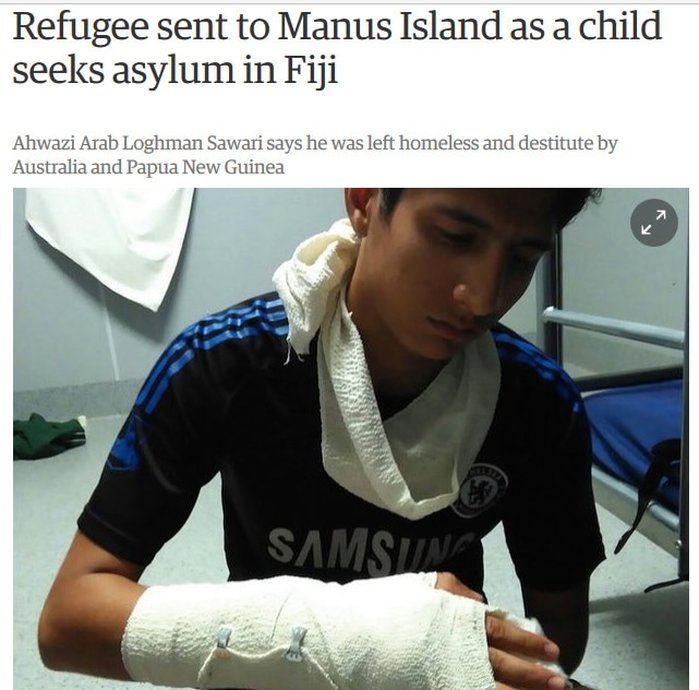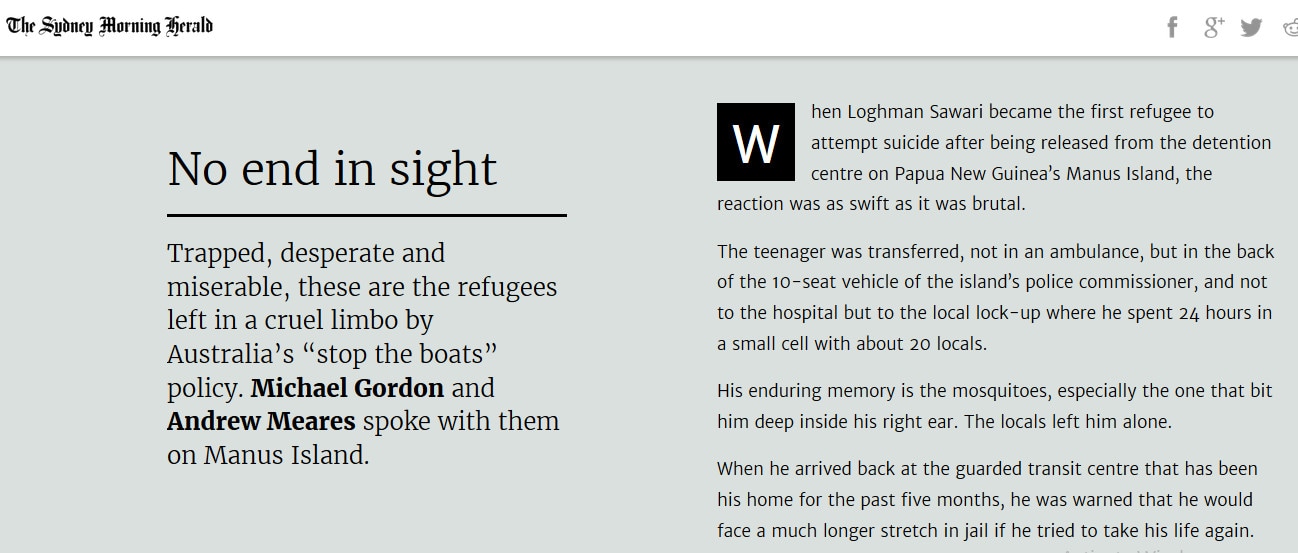Fijileaks founding Editor-in-Chief VICTOR LAL:
The delay in not lodging an asylum claim on arrival in a country is not a ground to ambush someone and deport him to PNG. Yes, Loghaman Sawari travelled on a PNG passport (fake or genuine) but that does not mean he is or was safe there. Australia wrongly sent Sawari to the men-only camp on Manus Island as a 17-year-old in August 2013, despite the fact he was carrying a photocopy of his national identity document that showed his birth date, and told immigration officials he was under 18. When the mistake was discovered, and the Australian authorities conceded the mistake, he was not removed from Manus, but kept on the island, locked in isolation with another child, until his 18th birthday. During his incarceration he was also assaulted by a security guard for asking for more washing powder; he was taken to hospital for medical treatment. Sawari also attempted to commit suicide. He was later accepted as a refugee and had lived in Papua New Guinea outside the camp. But he complained he had been physically attacked by locals, threatened, harassed and had lived for a period in poverty on the street (Remember the Indo-Fijian victims of Rabuka and Speight coups). Meanwhile, he was lured into giving himself up to Fiji Immigration authorities on the understanding that he (through his lawyer) would finally explain his case. But he was TRICKED, ARRESTED and DEPORTED to Papua New Guinea. Since he was not even allowed to argue his case, Khaiyum and the UNHCR cannot claim that his application would have been without MERIT. If UNHCR advised Khaiyum on Sawari's legal standing which resulted in his (Sawari's) deportation, then UNHCR is equally complicit in the violation of UN convention on refugees and asylum seekers. It is quite clear that Sawari took ten days to finally come forward because he had feared from the day he landed in Fiji that he would be DEPORTED to Papua New Guinea by Fiji's Attorney-General and Minister of Justice, Aiyaz Sayed Khaiyum, the man who himself
*****LIED*****
on his visa application to try and sneak into the United States
“A person who knowingly misleads or attempts to mislead any immigration officer in relation to any matter material to the performance or exercise by any immigration officer of any duty, function, power or discretion commits an offence.” - Aiyaz Khaiyum, justifying Sawari's deportation to PNG.
 LAWLESS
LAWLESS By Vijay Narayan
Friday 03/02/2017
Fijivillage News
Attorney General Aiyaz Sayed-Khaiyum has stated that Loghman Sawari was deported from Fiji to Papua New Guinea today after entering Fiji on a Papua New Guinean passport.
Sayed-Khaiyum says Sawari is claiming to be a refugee but did not present himself as a refugee seeking asylum to immigration officials on arrival in Fiji, nor, after ten days, did he lodge an application for asylum, personally or through his lawyer.
The Attorney General also reveals that the United Nations High Commissioner for Refugees (UNHCR) has advised Fiji that Sawari is not recognised as a refugee under the UNHCR mandate.
Sayed-Khaiyum says UNHCR has further advised that he is a refugee recognised by Papua New Guinea under its national procedures, so Fiji has merely returned Sawari to his rightful place of residence. He also says Sawari eluded the authorities during his ten days in Fiji while posting photographs of himself on social media at various locations. Sayed-Khaiyum says under international law, anyone who is seeking political asylum is required to lodge an application without delay.
He says in the case of Sawari, this did not happen.
The Attorney General says Sawari’s lawyer who has been publicly advocating his position through the media, failed to facilitate a prompt application as required under international conventions pertaining to applications for refugee status. Sayed-Khaiyum also confirms that the authorities in Fiji have been informed by their Papua New Guinean counterparts that Sawari’s Papua New Guinea passport was obtained by fraudulent means.
He says on this basis, Sawari was also in breach of Fijian law which states that “a person who knowingly misleads or attempts to mislead any immigration officer in relation to any matter material to the performance or exercise by any immigration officer of any duty, function, power or discretion commits an offence.”
The Attorney General says the Government notes that Sawari is claiming that he feared for his life. He says this begs the question as to why for ten days he failed to file an application for asylum. Sayed-Khaiyum says despite several attempts by the Immigration Department to engage with Sawari, these attempts were ignored.
The Attorney General says Fiji remains fully committed to the Convention and Protocol Relating to the Status of Refugees, but we cannot tolerate a situation in which a person who is not an asylum seeker and who has already been granted refugee status in another country flagrantly violates the law.
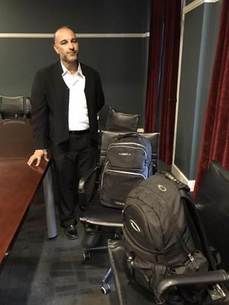 Lautoka lawyer Aman Ravindra-Singh with his client Loghman Sawari's bags which he could not take with him after officials apprehended him
Lautoka lawyer Aman Ravindra-Singh with his client Loghman Sawari's bags which he could not take with him after officials apprehended him By NASIK SWAMI, Fiji Times,
Friday, February 03, 2017
THE lawyer for Iranian national Loghman Sawari who was deported from the country this morning says his client entered Fiji through legal means.
At a press conference in Suva in the last hour, Lautoka lawyer Aman Ravindra-Singh said his client entered the country on a Papua New Guinea passport and was granted a tourist visa on arrival at the Nadi International Airport.
Mr Ravindra-Singh, however, could not confirm whether the passport his client was carrying was legitimate.
He relayed that he was on his way to Suva to meet Immigration director Nemani Vuniwaqa and lodge his client's application to seek asylum in Fiji.
The lawyer said he was given the assurance from Mr Vuniwaqa that nothing would happen to his client.
However, Mr Ravindra-Singh said his journey with his client from Lautoka to Suva was halted after Police stopped his car and apprehended his client.
He said after putting his client into another car, the Police officers sped towards Sigatoka Town.
Mr Ravindra-Singh said he followed the vehicle that transported his client and the vehicle stopped at the town where his client was put into another vehicle driven by Immigration officials.
He said at that point, he questioned the immigration officials why they were taking his client, and the response he received from the officials was that "it was a directive".
Mr Ravindra-Singh said he was shown a paper that carried the letterhead of the Immigration Department for a few seconds and he was not able to gather the particulars of the letter.
He said his client was then taken to the Nadi International Airport and was put on the next flight bound for PNG.

THE Fiji Human Rights and Anti-Discrimination Commission director, Ashwin Raj, says Fiji had breached international human rights laws by deporting Iranian national Loghman Sawari.
Mr Raj said the deportation raised fundamental questions about Fiji's capacity to balance the imperatives of national security with its international human rights laws.
He said the deportation showed that Fiji's immigration officials were not well versed with the laws and needed more training on the matter.
"From the perspective of international human rights law, Mr Sawari's deportation is contrary to international human rights law, and in particular Article 31, Article 32 and Article 33 of the 1951 Convention Relating to the Status of Refugees which Fiji succeeded to in 1972," Mr Raj said at a press conference in Suva today.
Article 32 on expulsion provides that:
1. The contracting States shall not expel a refugee lawfully in their territory save on grounds of national security or public order;
2. The expulsion of such a refugee shall be only in pursuance of a decision reached in accordance with due process of law. Except where compelling reasons of national security otherwise require, the refugee shall be allowed to submit evidence to clear himself, and to appeal to and be represented for the purpose before competent authority or a person or persons specially designated by the competent authority; and
3. The Contracting States shall allow such a refugee a reasonable period within which to seek legal admission into another country. The Contracting States reserve the right to apply during that period such internal measures as they may deem necessary.
Mr Raj said the Commission was concerned that the deportation decision by the Immigration department had the possibility of exposing Mr Sawari to inhumane and degrading treatment. Source: Fiji Times, 3 February 2017
(a) alienage;
(b) genuine risk;
(c) serious harm for which the state is accountable;
(d) nexus to civil or political status; and
(e) the need for and appropriateness of international protection
The questions to be addressed in the determination process, the students of refugee studies and asylum law are taught, are as follows: standard of proof in refugee claims; the use of international human rights law to inform refugee determination; the extent of a state's duty to protect its citizens; prosecution as distinguished from persecution; the violation of socio-economic human rights as the basis for a refugee claim; and the determination of claims grounded in generalised circumstances
